The year is 1989. In that year, people such as Taylor Swift, Danielle Radcliff, the late Avicii, SZA, Pewdiepie, Markiplier, and myself were born. Songs like “Bust A Move” by Young MC, “Cherish” and “Like A Prayer” by Madonna, and “Love Shack” by The B-52’s topped the charts. Movies like Disney’s The Little Mermaid, the Tim Burton directed Batman, Ghostbusters II, and Weekend At Bernie’s premiered in theaters. The Simpsons, Chip n’ Dale Rescue Rangers, Family Matters, Baywatch, and Seinfeld premiered on TV. In Japan, anime like Dragon Ball Z, Patlabor, and Ranma 1/2 premiered on TV while Kiki’s Delivery Service premiered in theaters. Video games like Teenage Mutant Ninja Turtles, Final Fight, SimCity, and DuckTales came out while Sega launched arcade games like Golden Axe, Turbo OutRun, and Tetris. Sega had done something else even more significant on this day that very same year, though. They launched the Sega Mega-Drive in North America as the Sega Genesis and the world would never be the same. Happy 35th anniversary!
On August 14th, 1989, Sega of America launched the Genesis in North America to much fanfare, including with a televised launch party attended by convicted felon and overall weirdo Donald Trump. Sega had failed to make much of a splash in North America with the still beloved Master System, but they had a new plan in mind for the Genesis. That plan included a fierce mockery of Nintendo’s strict adherence to sanitized, family friendly gaming, with the tagline “Genesis Does What Nintendon’t” remaining a staple in gamer lingo. This allowed Sega to stand out with the teens-to-adults crowd and ended up with Sega being the first video game console manufacturer to seriously threaten Nintendo’s market dominance, as well as inspiring future console rivals Sony and Microsoft to do the same with the PlayStation and Xbox respectively, while stealing Sega’s thunder in the process. Today, the Sega Genesis lives on in gaming and pop culture history as one of the most influential and memorable gaming consoles of all time and a hallmark of the 1990’s.
Come with us past the break to continue this celebration.
When the Sega Genesis launched in North America, the Mega-Drive had launched the previous year in Japan already. Unfortunately, the Mega-Drive did not have as good of a run in Japan as it would later have in the western world. Today, the Mega-Drive enjoys a stronger following in retrospect in Japan, but in North America, the Genesis was always loved by many, selling over 20 million consoles just in that continent. After all, the Genesis also introduced the world to many beloved video game classics like Streets of Rage, Toejam & Earl, Shining Force, and last-but-not-least, Sonic the Hedgehog. These games would be heavily lauded in their day and go on to inspire games for decades to come, while Sonic would launch a multi-billion dollar media franchise that continues to run strong to this very day with movies, cartoons, comics, as well as new games like the upcoming Sonic X Shadow Generations and Sonic Rumble coming in on a regular basis. Sonic the Hedgehog himself was one of the most recognizable media characters in his early years, surpassing even Mickey Mouse, and continues to be one of the most widely recognizable video game mascots of all time, alongside greats like Mario, Pac-Man, Pikachu, and Master Chief.
Sega Genesis also appeared in a lot of media throughout the years. While the Genesis was still commercially relevant, the console and it’s games were either shown or mentioned in shows like Seinfeld and Space Ghost Coast To Coast, as well as movies like The Lost World: Jurassic Park. After the Genesis was retired, it would continue to be referenced in TV, in other video games, and sometimes in music videos. As you can see, we’ve documented a couple of these cameos here at SegaBits throughout the years.
The Genesis continues to inspire content creators everywhere, including musicians. Thanks to the Genesis’s iconic use of Yamaha’s 2612 audio chip, which was used to help ease development of arcade ports since that chip was also common in arcade games from the late 80’s and early 90’s, musicians often use it to craft music of their own. A lot of original music as well as covers of other songs have been made to spec with the Genesis’s hardware limits. Back in the 90’s, composers had to know how to program music specifically for the Yamaha sound chips or rely on a program like GEMS to compose music. Today, the retro musical enthusiast community has their own modern tools for easily composing YM2612 music, including DefleMask and Furnace. A special synthesizer was even revealed early this year specifically for making Genesis-style music. Here is a collection of music highlights made in the modern day with that classic Genesis sound.
If that one seems familiar, that may be because we’ve featured it on SegaBits before.
Even more amazing than that is the wide swath of games still being released for the Genesis today. While Sega themselves have washed their hands of the Genesis completely before launching the Dreamcast, indie developers have since taken up the reins of developing for Genesis, as well as many other long retired game consoles. Genesis games were usually coded in a long defunct programming language called Assembly, beyond a few exceptions, such as games by Sega Technical Institute like Sonic Spinball (1993) which were developed in C. Assembly is not commonly used today and documentation on the language is mostly lost to history, usually only remembered by surviving game developers from those days. Thankfully, the indie development scene today has a long list of modern tools and resources for developing Genesis games today, and are currently working on Sega CD and 32X development as well. All new Genesis games seem to be coming more frequently today, with a couple having been documented on right here on SegaBits.
As for the original games on Genesis, Sega is never shy about re-releasing as many of their old Genesis classics as they can. The company is rather infamous for how many times they bring out a new collection of Genesis games, but they do it out of respect for the console that put them on the map. Compilations such as the Sega Smash Pack series, Sega Genesis Collection (2006), and Sonic’s Ultimate Genesis Collection (2009) have released on earlier consoles while the most relevant collections today come in the form of Sega Genesis Classics and Sega Genesis – Nintendo Switch Online. (The latter having somehow not seen an update of games since June of last year.) Until last year, there was also Sega Forever on Android and iOS, though a few of those games are still available to download as of this writing. Sega also released the Sega Genesis Mini and the Sega Genesis Mini 2, two mini consoles that each contain their own unique list of games. (The Mini 2 is still available to purchase right now. The first Mini has been out of production for a few years.) Many Genesis games outside of Sega’s ownership have seen re-releases on modern systems too, including a couple of obscure games you might not have expected to see return. Other Genesis classics are tucked away in compilations of other games.
UPDATE: The Sega Genesis Classics collection mentioned above is about to be delisted from all digital storefronts on December 6th, 2024. Physical copies of the console versions will remain available for the foreseeable future, but if you want them on Steam, or if there’s any games in the Steam collection that you haven’t gotten yet and still want, get them right away. A few Genesis games available in other collections on Xbox that I have not mentioned above are also going away on that day.
Worth mentioning is that the Steam collection also has uncompressed ROMs of all the games available in the install folder ripe for the picking, in case you wish to make use of them in another emulator or a flash cartridge, making this an official way to buy ROMs directly from Sega, in a “grey area-y” type of way. (Phantasy Star IV is a bit more complicated, though.)

New hardware for original consoles is still being made too, such as the many flash cartridges from Krikzz that allow you to play game roms on Genesis consoles (including the recently released OpenMD) or the new Genesis controllers produced by Retro-Bit in partnership with Sega (Including the amazing new Big6 controller). Occasionally, original Genesis games even see an official cartridge reprint, a couple of which came from Retro-Bit.
So tell us all about your special memories of Sega Genesis in the comments below. Were you old enough to be there when the Genesis launched on that fateful day? Are you, perhaps, a younger gamer who’s only discovering the Genesis now? What are your favorite Genesis games or your favorite ways to play them? Lets hear all about it as we raise a toast to this legendary machine. Here’s to another 35 years of celebrating the Genesis.
Ad:
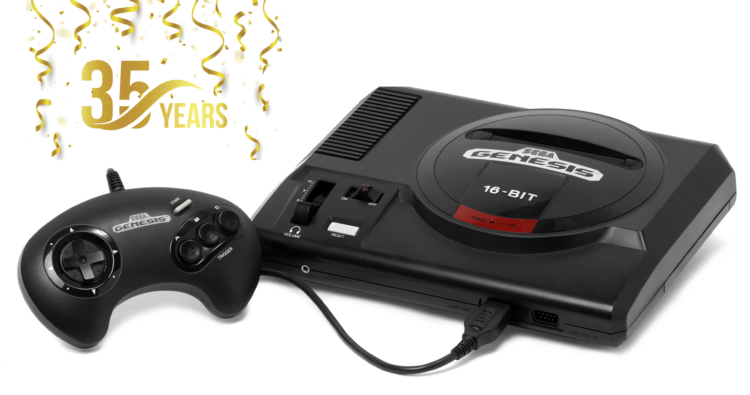

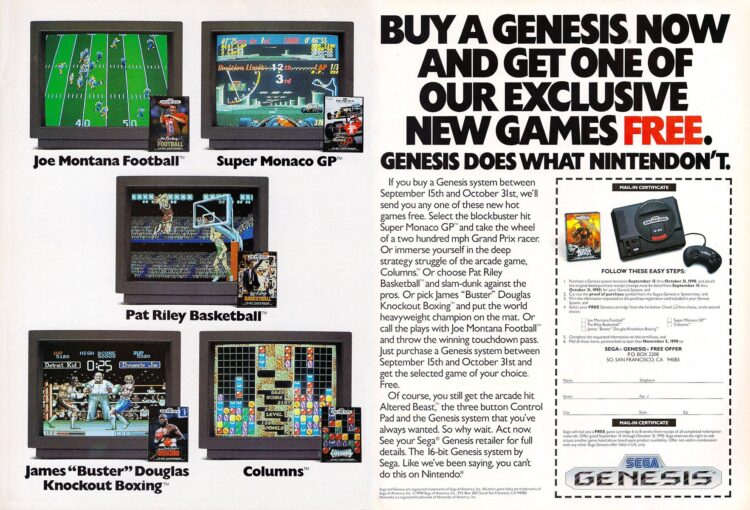
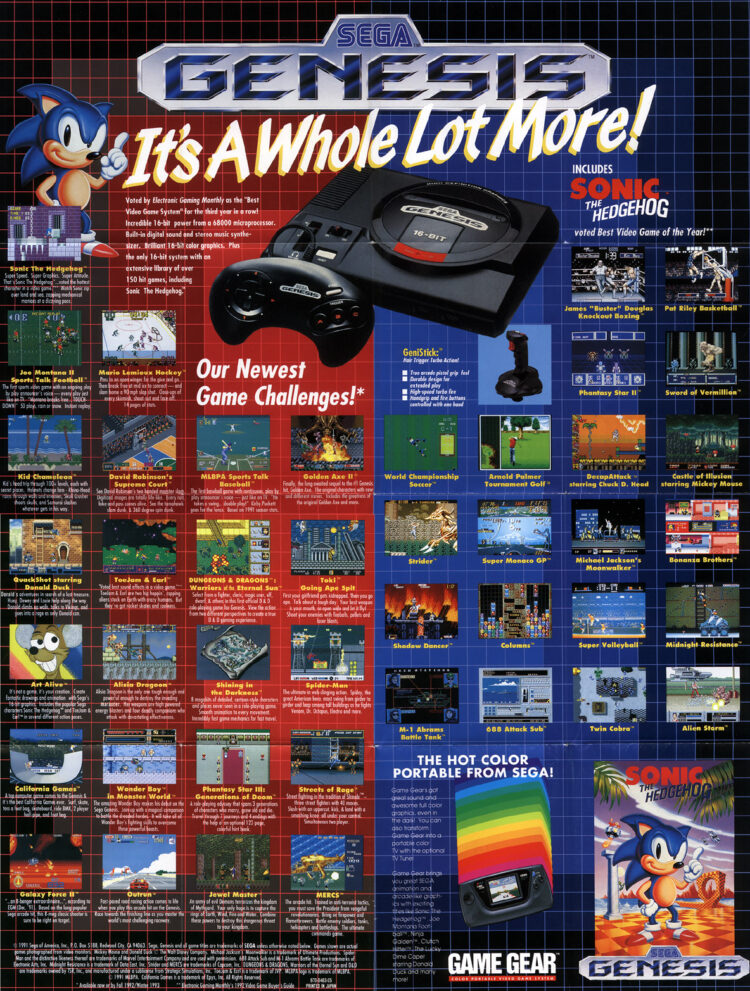
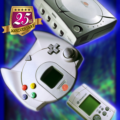
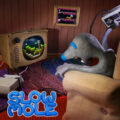

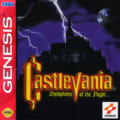
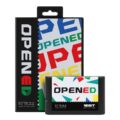
In 1989 I was more interested in arcade than home consoles. Took few years later to finally own a Mega Drive. Quack Shot was my first game.
In a post about the release of the Sega Genesis, you insult President Donald Trump. That has nothing to do with the Genesis. Bafk in 1989, Trump was not going to run for president for another 26 years.
shutup, nerd
I don’t think there should be mention of politics on video game sites, but save it with the snowflake hurt fee-fees. The former president spills out childish name-calling insults like a broken Pez dispenser, don’t go clutching your pearls when he’s on the receiving end of them.
Are you talking to me? I’m not offended. I just thought it was weird, jarring, and out of place.
100% agree. I’m so sick and tired of f’n politics being in EVERYTHING.
Gaming used to be escapism from the nonsense most of us deal with in our day to day lives.
Now you can’t even read about your favorite things without people randomly injecting their political nonsense.
Exactly! Now I can get back to playing NBA Jam as the Clintons and meeting with Ronald Reagan in Call of Duty.
Not to mention stopping Mr. X, who’s also a convicted felon, from stealing control of the White House in a violent insurrection in Streets of Rage 3. (I’m not kidding. This really happens.)
I’m glad you think it’s funny. I don’t. If you wanna discuss storylines in a video game? Awesome.
You wanna cry about real world politics? So be it. I’m out. Take a look around the industry as a whole, people are sick n tired of it, and people are voting with their wallets.
As a diehard Sega fan I was excited to come across this site, but if it’s just gonna be clowns injecting their personal feelings into articles, then I’ll find somewhere else
You’ll be back
“Presidential hopeless” doesn’t really work for someone who’s already been president.
Aside from that it doesn’t really fit with the article. I don’t live in America so saying the name “Trump” doesn’t get my blood up like it does for those down in it I guess, but it’s still probably better to leave it out. I know some people feel compelled to say something every time they have to say his name, but I just can’t see what it does for the article or the site.
You know what? That’s a good point. I’ve changed it.